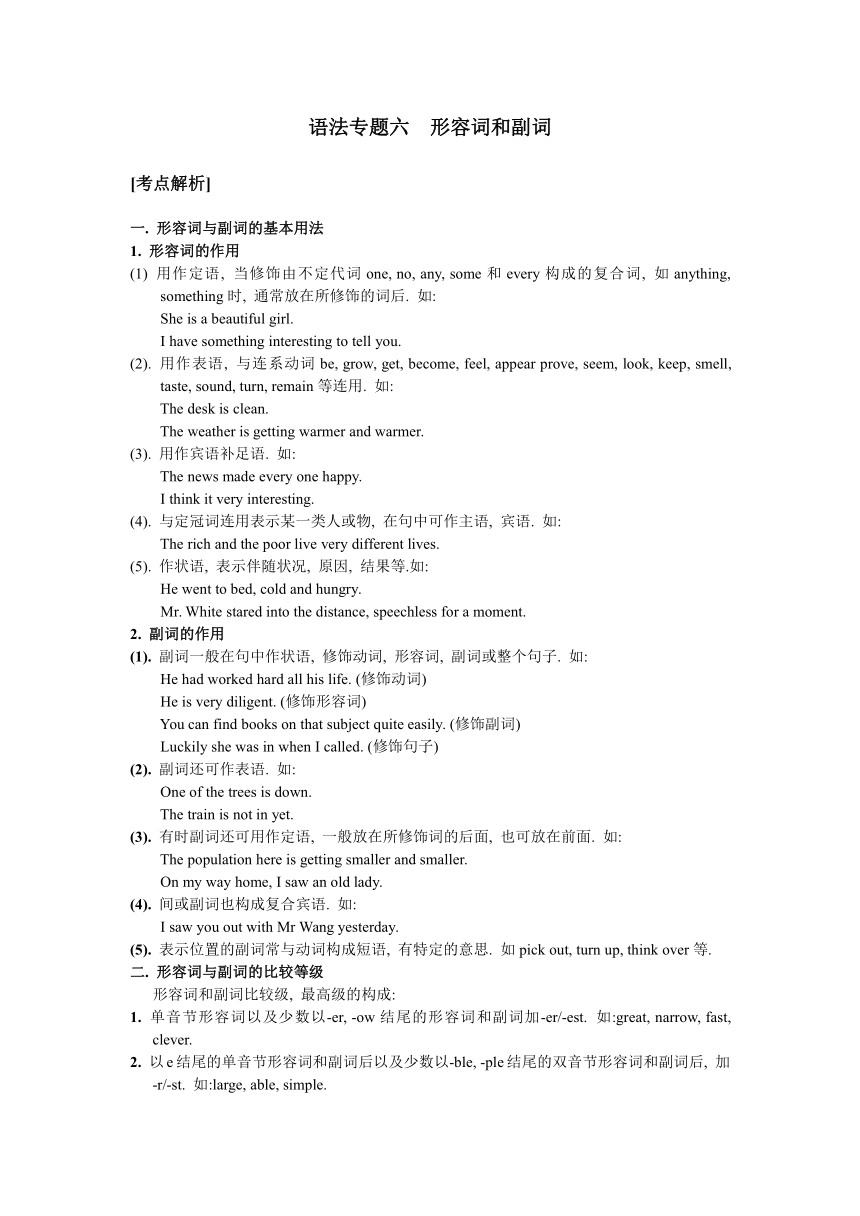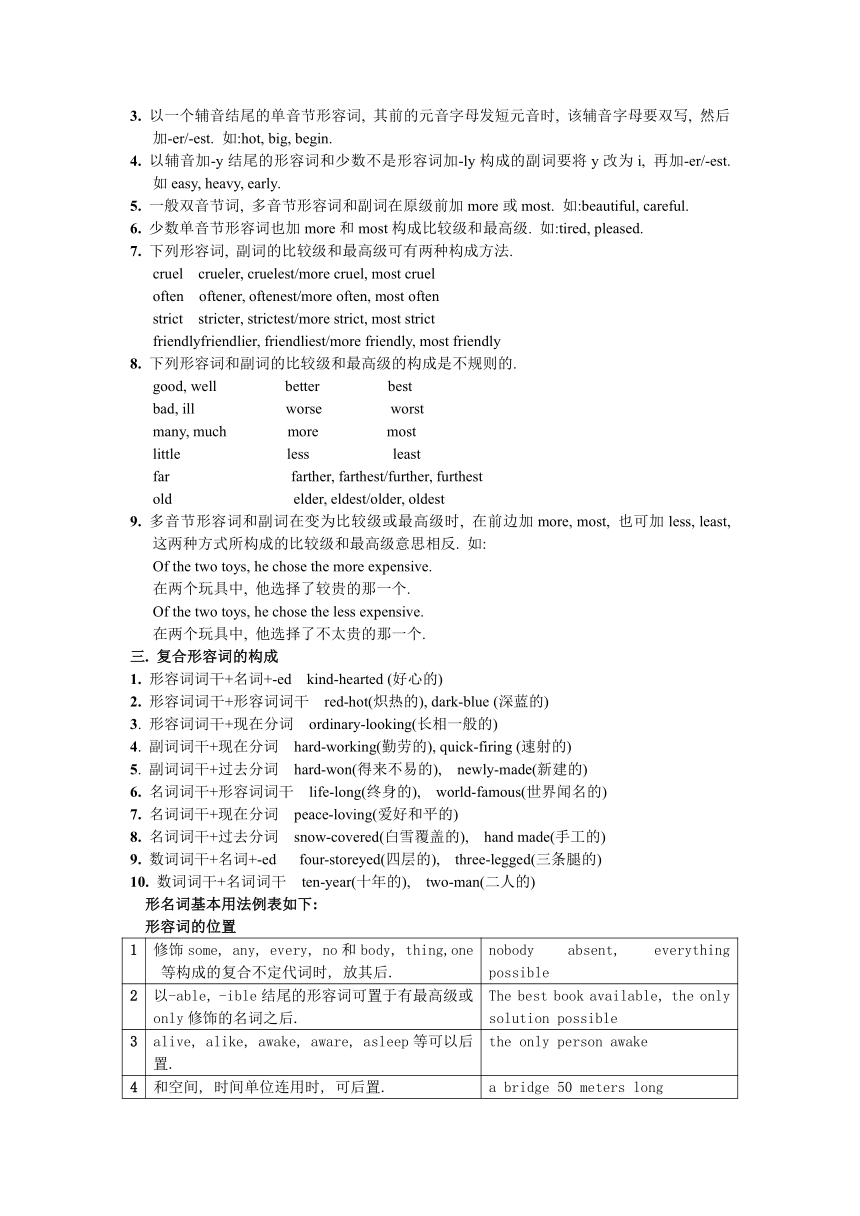形容词与副词用法[上学期]
图片预览


文档简介
语法专题六 形容词和副词
[考点解析]
一. 形容词与副词的基本用法
1. 形容词的作用
(1) 用作定语, 当修饰由不定代词one, no, any, some和every构成的复合词, 如anything, something时, 通常放在所修饰的词后. 如:
She is a beautiful girl.
I have something interesting to tell you.
(2). 用作表语, 与连系动词be, grow, get, become, feel, appear prove, seem, look, keep, smell, taste, sound, turn, remain等连用. 如:
The desk is clean.
The weather is getting warmer and warmer.
(3). 用作宾语补足语. 如:
The news made every one happy.
I think it very interesting.
(4). 与定冠词连用表示某一类人或物, 在句中可作主语, 宾语. 如:
The rich and the poor live very different lives.
(5). 作状语, 表示伴随状况, 原因, 结果等.如:
He went to bed, cold and hungry.
Mr. White stared into the distance, speechless for a moment.
2. 副词的作用
(1). 副词一般在句中作状语, 修饰动词, 形容词, 副词或整个句子. 如:
He had worked hard all his life. (修饰动词)
He is very diligent. (修饰形容词)
You can find books on that subject quite easily. (修饰副词)
Luckily she was in when I called. (修饰句子)
(2). 副词还可作表语. 如:
One of the trees is down.
The train is not in yet.
(3). 有时副词还可用作定语, 一般放在所修饰词的后面, 也可放在前面. 如:
The population here is getting smaller and smaller.
On my way home, I saw an old lady.
(4). 间或副词也构成复合宾语. 如:
I saw you out with Mr Wang yesterday.
(5). 表示位置的副词常与动词构成短语, 有特定的意思. 如pick out, turn up, think over等.
二. 形容词与副词的比较等级
形容词和副词比较级, 最高级的构成:
1. 单音节形容词以及少数以-er, -ow结尾的形容词和副词加-er/-est. 如:great, narrow, fast, clever.
2. 以e结尾的单音节形容词和副词后以及少数以-ble, -ple结尾的双音节形容词和副词后, 加-r/-st. 如:large, able, simple.
3. 以一个辅音结尾的单音节形容词, 其前的元音字母发短元音时, 该辅音字母要双写, 然后加-er/-est. 如:hot, big, begin.
4. 以辅音加-y结尾的形容词和少数不是形容词加-ly构成的副词要将y改为i, 再加-er/-est.如easy, heavy, early.
5. 一般双音节词, 多音节形容词和副词在原级前加more或most. 如:beautiful, careful.
6. 少数单音节形容词也加more和most构成比较级和最高级. 如:tired, pleased.
7. 下列形容词, 副词的比较级和最高级可有两种构成方法.
cruel crueler, cruelest/more cruel, most cruel
often oftener, oftenest/more often, most often
strict stricter, strictest/more strict, most strict
friendlyfriendlier, friendliest/more friendly, most friendly
8. 下列形容词和副词的比较级和最高级的构成是不规则的.
good, well better best
bad, ill worse worst
many, much more most
little less least
far farther, farthest/further, furthest
old elder, eldest/older, oldest
9. 多音节形容词和副词在变为比较级或最高级时, 在前边加more, most, 也可加less, least, 这两种方式所构成的比较级和最高级意思相反. 如:
Of the two toys, he chose the more expensive.
在两个玩具中, 他选择了较贵的那一个.
Of the two toys, he chose the less expensive.
在两个玩具中, 他选择了不太贵的那一个.
三. 复合形容词的构成
1. 形容词词干+名词+-ed kind-hearted (好心的)
2. 形容词词干+形容词词干 red-hot(炽热的), dark-blue (深蓝的)
3. 形容词词干+现在分词 ordinary-looking(长相一般的)
4. 副词词干+现在分词 hard-working(勤劳的), quick-firing (速射的)
5. 副词词干+过去分词 hard-won(得来不易的), newly-made(新建的)
6. 名词词干+形容词词干 life-long(终身的), world-famous(世界闻名的)
7. 名词词干+现在分词 peace-loving(爱好和平的)
8. 名词词干+过去分词 snow-covered(白雪覆盖的), hand made(手工的)
9. 数词词干+名词+-ed four-storeyed(四层的), three-legged(三条腿的)
10. 数词词干+名词词干 ten-year(十年的), two-man(二人的)
形名词基本用法例表如下:
形容词的位置
1 修饰some, any, every, no和body, thing,one等构成的复合不定代词时, 放其后. nobody absent, everything possible
2 以-able, -ible结尾的形容词可置于有最高级或only修饰的名词之后. The best book available, the only solution possible
3 alive, alike, awake, aware, asleep等可以后置. the only person awake
4 和空间, 时间单位连用时, 可后置. a bridge 50 meters long
5 成队的形容词可以后置. a huge room simple and beautiful
6 形容词短语一般后置. A man difficult to get on with
多个形容词修饰同一个名词的顺序
代 词 数 词 性 状 形 容 词 名词
冠词前的形容词 冠词 指示代词 不定代词 代词所有格 序数词 基数词 性质状l 大小长短形 状 新旧温度 颜色 国籍产地 材料质地
allbothsuch the thisanotheryour secondnext onefour beautifulgoodpoor largegood poor newcool blackyellow ChineseLondon silkstone
[高考示例]
【例一】2005江苏高考--How is everything going on with you in Europe --Quite well. Not so smoothly as I hoped._______.A. though B. instead C. either D. too提示:Quite well与Not so smoothly as I hoped前后语意相反, 所以应该填表示转折关系的副词答案:A【例二】2005北京高考This ______girl is Linda’s cousin.pretty little Spanish Spanish little prettySpanish pretty littleLittle pretty Spanish提示:多个形容词修饰名词时, 其顺序为: 限定词-数词-描绘词-(大小,长短, 形状, 新旧, 颜色)-出处-材料性质, 类别-名词.答案:A【例三】2005浙江高考Bob ran the 100 meters in 9.91 seconds, and I have not seen ______this year.A. the best B. better C. the most D. more提示: “我从没有看到过更好的,” 二者比较用better.答案:B【例四】2005福建高考--Why didn’t you buy the camera you had longed for --I had planned to , buy I was 50 ______ A. fewer B. less C. cheap D. short提示:语意为 “我还缺50英镑”. short意为 “不足的; 缺少的”,是形容词作后置定语.答案:D【例五】2005江西高考--Must I turn off the gas after cooking --Of course. You can never be ______careful with that.A. enough B. too C. so D. very提示:can never(can’t)…too…意为 “再怎么……也不过份”.答案:B though既可用作连词, 也可用作副词, 作副词时常用于句末, 表示转折. 多个形容词修饰同一名词时, 越接近名词本质的形容词, 越靠近所修饰的名词. 对比较级的用法, 要分清是两者相比较, 还是多者相比较. 即要分清用比较级还是最高级. 形容词用作定语时要考虑与之搭配的名词的情况. 要搞清楚每个形容词和副词的准确含义, 同时也要注意它们在一些固定词组或短语中的用法.
[触类旁通]
1. The performer was waving his stick in the street and it ______missed the child standing nearly.
A. narrowly B. nearly C. hardly D. closely
2. Our parents always get a little bit ______if we don’t manage to arrive when we say we will.
A. eager B. anxious C. patient D. earnest
3. These natural parks are very important for preserving many animals, which would ______run the risk of becoming extinct.
A. otherwise B. therefore C. besides D. however
4. —It’s ______that he said: “I am ______to help you.”
--Don’t take it seriously. He is always playing that trick.
A. sure; sure B. certain; certain
C. sure; certain D. certainly; surely
5. We don’t care if a hunting dog smells ______, but we really don’t want him to smell ______
A. well; well B. badly; bad C. bad; badly D. well; bad
6. We planned to go to the seaside for the weekend, but because of the bad weather we had to stay at home ______.
A. however B. though C. really D. instead
7. --English is too boring, madam. I can’t simply remember a word of it.
--Don’t lose heart, boy. ______you learn, ______you will be in it.
A. More; more interested B. The more; the more interested
B. The harder; the more interesting D. Harder; much interest
8. --Have you received Jack’s plan
--Yes, but I don’t think his plan is ______.
A. worth being considered B. worthy of considering
C. worthy to be considered D. worth to be considered
9. Then in the garden we found old Smith, ______in his eighties.
A. good B. well C. quite D. very
10. It takes a long time to go there by train, it’s ______by road.
A. quick B. the quickest C. much quick D. quicker
答案: 1. A 2. B 3. A 4. B 5. C 6. D 7. B 8. B 9. B 10. D
[考点解析]
一. 形容词与副词的基本用法
1. 形容词的作用
(1) 用作定语, 当修饰由不定代词one, no, any, some和every构成的复合词, 如anything, something时, 通常放在所修饰的词后. 如:
She is a beautiful girl.
I have something interesting to tell you.
(2). 用作表语, 与连系动词be, grow, get, become, feel, appear prove, seem, look, keep, smell, taste, sound, turn, remain等连用. 如:
The desk is clean.
The weather is getting warmer and warmer.
(3). 用作宾语补足语. 如:
The news made every one happy.
I think it very interesting.
(4). 与定冠词连用表示某一类人或物, 在句中可作主语, 宾语. 如:
The rich and the poor live very different lives.
(5). 作状语, 表示伴随状况, 原因, 结果等.如:
He went to bed, cold and hungry.
Mr. White stared into the distance, speechless for a moment.
2. 副词的作用
(1). 副词一般在句中作状语, 修饰动词, 形容词, 副词或整个句子. 如:
He had worked hard all his life. (修饰动词)
He is very diligent. (修饰形容词)
You can find books on that subject quite easily. (修饰副词)
Luckily she was in when I called. (修饰句子)
(2). 副词还可作表语. 如:
One of the trees is down.
The train is not in yet.
(3). 有时副词还可用作定语, 一般放在所修饰词的后面, 也可放在前面. 如:
The population here is getting smaller and smaller.
On my way home, I saw an old lady.
(4). 间或副词也构成复合宾语. 如:
I saw you out with Mr Wang yesterday.
(5). 表示位置的副词常与动词构成短语, 有特定的意思. 如pick out, turn up, think over等.
二. 形容词与副词的比较等级
形容词和副词比较级, 最高级的构成:
1. 单音节形容词以及少数以-er, -ow结尾的形容词和副词加-er/-est. 如:great, narrow, fast, clever.
2. 以e结尾的单音节形容词和副词后以及少数以-ble, -ple结尾的双音节形容词和副词后, 加-r/-st. 如:large, able, simple.
3. 以一个辅音结尾的单音节形容词, 其前的元音字母发短元音时, 该辅音字母要双写, 然后加-er/-est. 如:hot, big, begin.
4. 以辅音加-y结尾的形容词和少数不是形容词加-ly构成的副词要将y改为i, 再加-er/-est.如easy, heavy, early.
5. 一般双音节词, 多音节形容词和副词在原级前加more或most. 如:beautiful, careful.
6. 少数单音节形容词也加more和most构成比较级和最高级. 如:tired, pleased.
7. 下列形容词, 副词的比较级和最高级可有两种构成方法.
cruel crueler, cruelest/more cruel, most cruel
often oftener, oftenest/more often, most often
strict stricter, strictest/more strict, most strict
friendlyfriendlier, friendliest/more friendly, most friendly
8. 下列形容词和副词的比较级和最高级的构成是不规则的.
good, well better best
bad, ill worse worst
many, much more most
little less least
far farther, farthest/further, furthest
old elder, eldest/older, oldest
9. 多音节形容词和副词在变为比较级或最高级时, 在前边加more, most, 也可加less, least, 这两种方式所构成的比较级和最高级意思相反. 如:
Of the two toys, he chose the more expensive.
在两个玩具中, 他选择了较贵的那一个.
Of the two toys, he chose the less expensive.
在两个玩具中, 他选择了不太贵的那一个.
三. 复合形容词的构成
1. 形容词词干+名词+-ed kind-hearted (好心的)
2. 形容词词干+形容词词干 red-hot(炽热的), dark-blue (深蓝的)
3. 形容词词干+现在分词 ordinary-looking(长相一般的)
4. 副词词干+现在分词 hard-working(勤劳的), quick-firing (速射的)
5. 副词词干+过去分词 hard-won(得来不易的), newly-made(新建的)
6. 名词词干+形容词词干 life-long(终身的), world-famous(世界闻名的)
7. 名词词干+现在分词 peace-loving(爱好和平的)
8. 名词词干+过去分词 snow-covered(白雪覆盖的), hand made(手工的)
9. 数词词干+名词+-ed four-storeyed(四层的), three-legged(三条腿的)
10. 数词词干+名词词干 ten-year(十年的), two-man(二人的)
形名词基本用法例表如下:
形容词的位置
1 修饰some, any, every, no和body, thing,one等构成的复合不定代词时, 放其后. nobody absent, everything possible
2 以-able, -ible结尾的形容词可置于有最高级或only修饰的名词之后. The best book available, the only solution possible
3 alive, alike, awake, aware, asleep等可以后置. the only person awake
4 和空间, 时间单位连用时, 可后置. a bridge 50 meters long
5 成队的形容词可以后置. a huge room simple and beautiful
6 形容词短语一般后置. A man difficult to get on with
多个形容词修饰同一个名词的顺序
代 词 数 词 性 状 形 容 词 名词
冠词前的形容词 冠词 指示代词 不定代词 代词所有格 序数词 基数词 性质状l 大小长短形 状 新旧温度 颜色 国籍产地 材料质地
allbothsuch the thisanotheryour secondnext onefour beautifulgoodpoor largegood poor newcool blackyellow ChineseLondon silkstone
[高考示例]
【例一】2005江苏高考--How is everything going on with you in Europe --Quite well. Not so smoothly as I hoped._______.A. though B. instead C. either D. too提示:Quite well与Not so smoothly as I hoped前后语意相反, 所以应该填表示转折关系的副词答案:A【例二】2005北京高考This ______girl is Linda’s cousin.pretty little Spanish Spanish little prettySpanish pretty littleLittle pretty Spanish提示:多个形容词修饰名词时, 其顺序为: 限定词-数词-描绘词-(大小,长短, 形状, 新旧, 颜色)-出处-材料性质, 类别-名词.答案:A【例三】2005浙江高考Bob ran the 100 meters in 9.91 seconds, and I have not seen ______this year.A. the best B. better C. the most D. more提示: “我从没有看到过更好的,” 二者比较用better.答案:B【例四】2005福建高考--Why didn’t you buy the camera you had longed for --I had planned to , buy I was 50 ______ A. fewer B. less C. cheap D. short提示:语意为 “我还缺50英镑”. short意为 “不足的; 缺少的”,是形容词作后置定语.答案:D【例五】2005江西高考--Must I turn off the gas after cooking --Of course. You can never be ______careful with that.A. enough B. too C. so D. very提示:can never(can’t)…too…意为 “再怎么……也不过份”.答案:B though既可用作连词, 也可用作副词, 作副词时常用于句末, 表示转折. 多个形容词修饰同一名词时, 越接近名词本质的形容词, 越靠近所修饰的名词. 对比较级的用法, 要分清是两者相比较, 还是多者相比较. 即要分清用比较级还是最高级. 形容词用作定语时要考虑与之搭配的名词的情况. 要搞清楚每个形容词和副词的准确含义, 同时也要注意它们在一些固定词组或短语中的用法.
[触类旁通]
1. The performer was waving his stick in the street and it ______missed the child standing nearly.
A. narrowly B. nearly C. hardly D. closely
2. Our parents always get a little bit ______if we don’t manage to arrive when we say we will.
A. eager B. anxious C. patient D. earnest
3. These natural parks are very important for preserving many animals, which would ______run the risk of becoming extinct.
A. otherwise B. therefore C. besides D. however
4. —It’s ______that he said: “I am ______to help you.”
--Don’t take it seriously. He is always playing that trick.
A. sure; sure B. certain; certain
C. sure; certain D. certainly; surely
5. We don’t care if a hunting dog smells ______, but we really don’t want him to smell ______
A. well; well B. badly; bad C. bad; badly D. well; bad
6. We planned to go to the seaside for the weekend, but because of the bad weather we had to stay at home ______.
A. however B. though C. really D. instead
7. --English is too boring, madam. I can’t simply remember a word of it.
--Don’t lose heart, boy. ______you learn, ______you will be in it.
A. More; more interested B. The more; the more interested
B. The harder; the more interesting D. Harder; much interest
8. --Have you received Jack’s plan
--Yes, but I don’t think his plan is ______.
A. worth being considered B. worthy of considering
C. worthy to be considered D. worth to be considered
9. Then in the garden we found old Smith, ______in his eighties.
A. good B. well C. quite D. very
10. It takes a long time to go there by train, it’s ______by road.
A. quick B. the quickest C. much quick D. quicker
答案: 1. A 2. B 3. A 4. B 5. C 6. D 7. B 8. B 9. B 10. D
